Ahoy, squirts! Quint here. It’s been an amazing couple of weeks for me. My last two interviews were with my favorite living filmmakers. My chat with Steven Spielberg focused on Jaws and this AICN Legends chat with John Carpenter was meant to focus more on his overall career, something I found impossible even in 45 minutes.
When I got the wrap up alert from the publicist I had just gotten to Big Trouble In Little China… and that was even skipping over Christine, Elvis and Starman. There’s some good stuff in there about Halloween and The Thing, but damn. The man’s filmography is so full of gold that even 45 minutes only scratches the surface.
So, while I don’t have any commitments from Carpenter and no real idea if I can get him on the line again, I’m still going to call this Part 1 of my AICN Legends chat with John Carpenter. What can I say? I’m an optimistic guy.
Nobody has had a run like Carpenter. From Assault on Precinct 13 through They Live (and I’d even argue through In the Mouth of Madness, but that may just be me) the man turned in nothing but good to fucking great movies. And in multiple genres.
Hope you guys enjoy this Part 1 chat with the truly legendary John Carpenter where we talk about Kurt Russell, westerns, Donald Pleasence, Rob Bottin, Jed the Dog, Ennio Morricone, Goblin, Jack Burton, Rob Zombie, how underappreciated Halloween III is and why I piss him off. Enjoy!
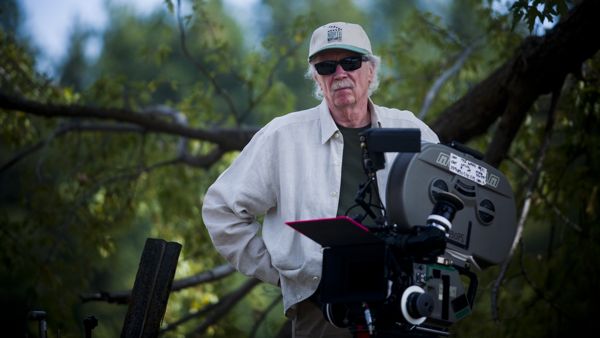
Quint: I actually want to start with ASSAULT ON PRECINCT 13 if that’s alright.
John Carpenter: Sure.
Quint: I know that that’s been compared to RIO BRAVO quite a bit and I know that you have a huge love of westerns and I love the results of you kind of adapting western formulas into modern thrillers or genre pictures. You have kind of made a unique stamp out of that, but do you think you will ever get to do a full on straight up western?
John Carpenter: I’ve learned in this business that you never say “never” about anything. I did many times in my career to my regret. “I’ll never do this. I’ll never work for this person again!” Blamo, here I am… I’m actually working right as we speak on a little gothic western, but not your traditional western; not a RIO BRAVO or RED RIVER or anything like that, but I am working on a gothic western. I don’t know if it will get made. In these times you never know what’s going to happen.
Quint: That’s exciting. I mean RED RIVER itself almost feels like a horror movie if you look at it. That’s what is really interesting to me about a lot of those older westerns is you can take out the threat of the Indians and make it zombies and it’s the same story.
John Carpenter: [Laughs] Okay, I see… Alright.
Quint: I was just watching a movie I believe is called FORT MASSACRE and that one really did. It felt like a zombie movie. It’s all about a group of cavalry men who are separated from their unit and so they are trying to get back to their unit while they are in Indian territory. They need supplies and all of this stuff and the supplies are surrounded by Indians… It really is as if you could just replace Indians with zombies and you have a modern day horror movie.
John Carpenter: Yeah.
Quint: But that’s really fascinating. I’m really curious about that film. I hope you get it off the ground.
John Carpenter: Well, we will see.
Quint: Something I really love about Halloween is that right off the bat you kind of tell people that this is something different with that great steadicam shot. Was that intentional or was that kind of the necessity of the lower budget?
John Carpenter: [Laughs] Was it intentional that I shot it in one shot like that?
Quint: Well, of course it’s intentional that you set it up that way, but was it intentional to use that as the way to kick off the film; to tell the audience Halloween wasn’t going to be your typical genre movie?
John Carpenter I don’t know if I was thinking “Hey audience, this isn’t your typical horror film,” but you have to understand I was classically trained at USC, so the inspirations for my films and for my style and technique were all from classical directors, so I went back to TOUCH OF EVIL and films like that.
You could say “Was Orson Welles trying to tell the audience that ‘this melodrama is different, because he has this big long tracking shot?” I don’t think that was his intention, that was the best way to tell the opening of the film, so that’s the way I looked at it.
Quint: You’re right, there is a lot of history with that kind of filmmaking, like Hitchcock’s ROPE as another one where it just seemed a very interesting way to tell that story.
John Carpenter: And SCARFACE, Howard Hawks’ SCARFACE has an opening shot that goes on for a long time, so you know it’s been done. It was challenging for us on the budget that we had to pull it off, but we managed to do it. Maybe it was the fact that that was an unusual technique for a low budget horror film.
Quint: In a lot of those instances, not in all of them, but in a lot of those exploitation films there’s not really an emphasis on the visual storytelling, it’s just about getting the money shots on the screen you know?
John Carpenter: I agree with you there. Sure.
Quint: And something else that you did extremely well with the movie is cast it, which is something you have had a great eye for throughout your career.
John Carpenter: Thank you. You know, anything that you find good about my work I would ascribe it to luck.
Quint: (laughs) I don’t know, there’s a consistency there. Luck can’t be there every time. You know what I mean?
John Carpenter: Anything you hate, just say “He’s untalented.” That’s usually the way it works.
Quint: No, I don’t do that. I’m too big of a fan.
John Carpenter: Sure you can.
Quint: But I love your cast in HALLOWEEN across the board, from Jaime Lee as the lead to having a veteran like Donald Pleasence in the movie. Pleasence gives such a manic, shifty eyed performance. I love that the voice of reason is almost as insane as the thing that he is hunting.
CLICK HERE TO READ ALONG WITH THE NEXT BIT IN AMAZING SOUND-O-TEXT!
John Carpenter: I agree with you. I love Donald and he was a real close friend. He did a great job for me. I’m not sure he agreed with the movie or agreed with what he was doing, but he did a great job for me.
Quint: How did you talk him into being in the film?
John Carpenter: Well, I asked him “Why are you doing this?” He said, “Well you know… I have an alimony to pay.” So, don’t ask that question too much.
He said that. He told me his daughter… This was in 1978, his daughter had seen ASSAULT ON PRECINCT 13 and had loved my music. That was the recommendation. My score from another film had impressed his daughter, so she told him he should work with me.
Quint: That’s awesome and you know that’s something again that is very unique to you specifically is you have a very specific visual style and you have a very recognizable musical style. Your scores are just as well known as your films. I’m a big fan of both, but especially your score for HALLOWEEN. It reminds me of the simplicity of John Williams’ main theme from JAWS or even Bernard Herrmann’s PSYCHO score. They were simple, but iconic, just like your Halloween score. What was the evolution of coming up with that score?
READ ALONG WITH THE NEXT BIT IN AMAZING SOUND-O-TEXT!
John Carpenter: You used the right word when you said “simplicity.” That’s my brain. It doesn’t go very far, it goes as far as it can go. My father taught me 5/4 time. When I was younger he bought me a set of bongos, believe it or not, for Christmas. He said, “Let me show you 5/4 time” and he pounded it out. (Carpenter vocalizes it and it sounds just like Halloween’s score)
So I remembered that, because I was pretty lousy at music anyway, but I used to score all of my films, because these were low budget films and I was cheap and it was quick, so I just did this little octave rock to 5/4 time. (vocalizes it again) I mean it’s really basic, but with this piano it had this dark little feel to it. It was a good, cheap way of getting the sound.
It was influenced primarily at the time by Bernard Herrmann who would get a maximum effect with very simple means. His idea was that PSYCHO… this was about a knife cutting up people. He used strings, high shrill sounds, to kind of represent the knife which I thought was just genius. Of course he was a genius, so that’s kind of how it evolved.
Quint: What’s interesting to me though is that you have the stingers and you have the typical horror cues to it, but then you also have something that I think is far more detailed and far more interesting in that you set a very creepy tone with the overall score.
John Carpenter: Thank you.
Quint: To me that’s the most important element. Tone is a huge thing with me for your films. One of my favorite movies of yours, and I feel it’s really underrated, is PRINCE OF DARKNESS.
John Carpenter: Thank you. You know I’ve heard that a couple of times recently. I agree with you.
Quint: I’ve talked to a lot of people and I’m like “Listen, you can look at HALLOWEEN or THE THING or ESCAPE FROM NEW YORK and those are all amazing films,” but there’s a tone that you hit I think in PRINCE OF DARKNESS that gets under my skin more than anything else in your filmography. It’s hard for me to actually put a finger on it. It’s like watching a Paul Schrader movie. There’s something that instantly just in the mix of the visuals, the sound design and the story that kind of gets on to your skin as a film viewer.
John Carpenter: Well, thank you. You know as I recall at the time there was a television interviewer who said PRINCE OF DARKNESS was the worst movie of 1986. Worst movie. Worst.
Quint: Well, they were wrong.
John Carpenter: Well, not necessarily. (laughs) It wasn’t at the time so much fun to be the target of that, but I don’t care. It was a badge of honor for me.
Quint: Also look at something like THE THING. As I’m sitting here talking to you I have a framed one-sheet of THE THING hanging on the wall and I know that for most people, especially of my generation, they cite that as a huge influence. Especially up and coming filmmakers. You have to, I imagine, take some pleasure from that considering how unsuccessful that film was upon release.
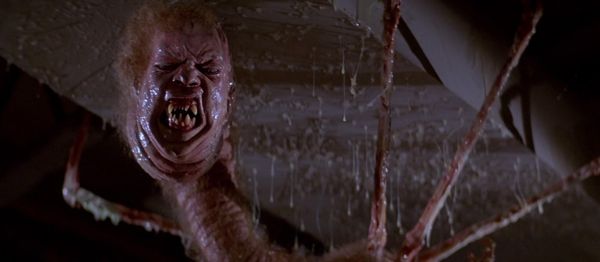
John Carpenter: Oh, it’s better than the reception it received in 1982 I’ll tell you that! A whole lot better.
Quint: People today can’t really fathom that that film didn’t blow up the world at that time.
John Carpenter: No, it blew up ME at that time. Oh, man… I lost a job… My career was in jeopardy after that movie. It was serious. It was big time serious, but I made it.
Quint: Can we talk a little bit about that film specifically? You got to work with Ennio Morricone for instance, which I imagine must have been a huge deal for you as such a big western fan.
John Carpenter: It was kind of a dream come true. Well, he in general is a great composer and very unusual, like experimental type stuff, which I hadn’t really thought of until I started looking at his scores. He is really, really inventive, but yeah I had a great script. I had a great cast. I had Universal paying a decent budget and there you have it.
Quint: The cast is absolutely incredible, but something that strikes me every single time I watch that movie is that you get a performance out of that dog that can rival most human actors.
CLICK HERE TO READ ALONG WITH THE NEXT BIT IN AMAZING SOUND-O-TEXT!
John Carpenter: That was Jed. He was the greatest. He was part wolf and is no longer with us, but he was incredibly smart. Incredibly smart. And we had to scale down the crew when we would shoot his scenes… well, because in fact he’s a wolf and so there was only a few of us standing around and he had to come in and we would be very still and he would sniff us to see if we were alright to get to know us. It was weird you know, “Well, here comes the wolf. Don’t move fast. Don’t make any noises. Be very still. Let him come to you and find out who you are,” said the trainer. “Okay, we’ll do that…” But yeah he was great. He was fabulous.
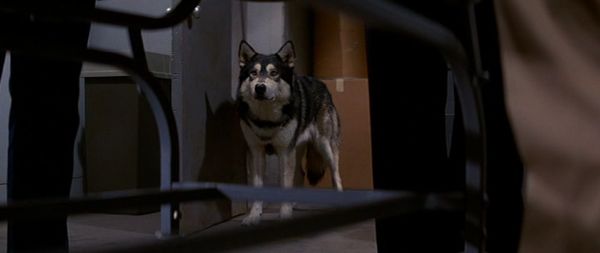
Quint: It’s weird, there’s a subtlety to that dog’s performance that really does blow me away. Every time I watch that film I notice it.
John Carpenter: He did this one shot… I’ve got to tell you… This one shot amazed me when we did it, when the camera was very low and tracking backwards down a hallway and we followed that dog and that dog looked in one door, he looked in another door, and then he looks in the third room and sees a man’s shadow and goes in. That dog never looked in the camera at us. It’s unbelievable that an animal could do that. It was unbelievable. I was speechless.
Quint: Did you have to shoot a lot to get that to work?
John Carpenter: No, he brought that to the day. It was unbelievable. I’m still in awe of that performance. Some actors have trouble walking and talking. I’ve directed actors who are walking down a hallway and can’t do it, but this dog was incredible… just amazing.
Quint: That’s awesome. What’s also a stand out of that film for a lot of people, myself included, is your work with Rob Bottin.
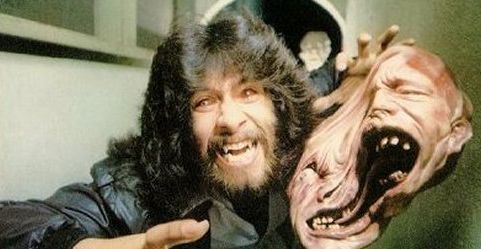
John Carpenter: What do you hear about Rob? You know, I’ve lost track of him over the years. I don’t know what he’s been up to. What’s going on with Rob?
Quint: I only know a little bit. I’m pretty friendly with Greg Nicotero and he talks to him occasionally. I know that he’s around, I just don’t think that he’s out there working?
John Carpenter: Why not?
Quint: That’s a great question. I have no idea. I would love to talk to him. He had an amazing run where he was just coming up with the most amazing effects. I love his work on Ridley Scott’s LEGEND and ROBOCOP… He did so much, in your film especially… I don’t know there’s just something so kind of twisted about what he can come up with and now he can execute those effects.
John Carpenter: Yeah, yeah.
Quint: I would love to know what he’s doing.
John Carpenter: Well, see you guys know everything, though.
Quint: No, we know very little. Haven’t you read our talkbacks?
John Carpenter: You know everything before the rest of us know it.
Quint: Some times. I will know when he’s signed on to do a movie, maybe. You know I went to the set of the prequel of THE THING that Universal is doing and…
John Carpenter: Oh yeah? How did it look?
Quint: From what I saw it looked good. I don’t know what the final product will look like. To me it really depends… You can do a lot of modernizing when you revisit something like The Thing, but especially since this is a prequel, they have to match your style and the tone and feel of your film if they want it to truly lead into it. The director told me that what he would like to do is he would love for audiences to end THE THING prequel and immediately start your film and have it be one continuous story. I think that they end this film with the Norwegian chasing the dog. I hope it works.
John Carpenter: Right, got it. Well, I know they have a photo of a very attractive looking girl with a flamethrower in her hands.
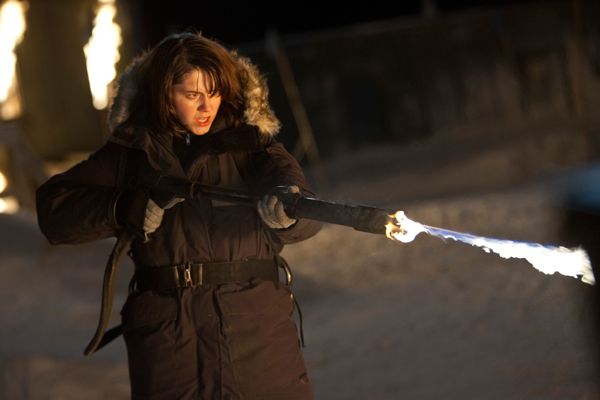
Quint: Yes.
John Carpenter: Now how bad can this movie be? (laughs) I saw that and said, “This has to be great!”
Quint: I read an early draft of the script. I don’t know how much was changed, but it kind of surprised me how much I liked it because I went in there very cynically. I’m not opposed to remakes, obviously I love your remake, but I went in kind of with a “prove it” attitude and when I read the script it was actually very smart in how it took some of the conventions of your film and turned them on their head.
John Carpenter: Eric Newman is a very talented producer. I like him a lot and he has always been very nice and very forthcoming, so there’s a lot of intelligence behind the project.
Quint: He struck me as a genuine fan. He didn’t seem to be trying to do a remake or a reboot or a prequel just to cash in on a known property.
John Carpenter: This is Hollywood, okay. It’s about commerce. Let’s never forget that.
Quint: I don’t think he would have gotten the budget without that aspect of it, but I think at least his motivations aren’t just going for the dollar. You know, I saw you speak at Dragon Con way back when you were promoting VAMPIRES.
John Carpenter: Where?
Quint: It was in Atlanta, Georgia.
John Carpenter: Oh I remember that, sure.
Quint: That was right when HALLOWEEN H2O came out and I remember people were like “How does this make you feel?” and you were like “As long as the checks keep coming in, they can make as many sequels as they want.”
John Carpenter: That’s right, there you go.
Quint: I really kind of dig your attitude on this stuff where it’s just like “Listen, my work is going to be there...”
John Carpenter: What else am I going to be able to do, anyway? I can’t stop it; so if I can’t do anything about it, why worry about it? Take the check. I will happily accept the check.
Quint: Rob Zombie kind of took HALLOWEEN into a radically different direction. Do you ever look critically at any of that stuff or just accept it as it stands?
John Carpenter: That’s his film. I can’t do anything about it. It’s his vision of what he wants to do. Rob has a vision and he put it on film. You either like it or you don’t, but it has nothing to do with mine. Superficially it does, but it’s a totally different movie. I have not seen the HALLOWEEN 2 that he did. I don’t know. I’ve heard about it. I’ve heard that he’s trying to give an explanation for Michael Myers; a psychological explanation. I don’t know though because I haven’t seen it.
Quint: His HALLOWEEN 2 goes into some really weird places, but I actually liked HALLOWEEN 2 a little bit more than I liked his first one, just because it gets really weird, like there is this dream sequence with all of these pumpkin headed people. I would almost prefer that he would do more of that crazy stuff, but I’m actually quite fond of big change-ups in franchises. I’m actually quite a fan of what you guys did with HALLOWEEN 3.
John Carpenter: Me, too. I really like that movie.

Quint: I think that that’s slowly becoming accepted. I know at the time people were like “What? Where’s Michael Myers?”
John Carpenter: “Why isn’t he killing teenagers?”
Quint: The Silver Shamrock jingle is awesome and that’s actually kind of catching on with horror fans today. Halloween III seems to gaining some respect. What do you think about that? I know at the time it wasn’t accepted.
CLICK HERE TO READ ALONG WITH THE NEXT BIT WITH AMAZING SOUND-O-TEXT!
John Carpenter: No, it was not. I made everybody who put up money for it unhappy and that’s, of course, never very pleasant. I have no idea, my friend, I have no idea. I couldn’t figure it out when it happened to me on THE THING.
I was befuddled. “Why do they hate this movie (Halloween 3) so much? Why do the fans hate it?” Fans. I could understand some of the critics. I got that, but why do the fans think I just raped Madonna; the Madonna off the cross. Why do they think I just defiled a classic? I didn’t get it and I still don’t understand it.
Maybe it was because, very simply, I had had a success with HALLOWEEN, I was a young whippersnapper, and I had a success with THE FOG and ESCAPE FROM NEW YORK and it was my time to be brought back down to earth. “Who do you think you are?” That’s my thought. That’s the only thing I can figure out.
Quint: Maybe. I think it might be… If you had done that with the second film, maybe people would have accepted it a little more, but I think maybe having two films with Michael Myers, people just in their minds they said “This is now his franchise,” you know? What year did HALLOWEEN 3 come out? It was the early 80’s right?
John Carpenter: Oh Lord. God, I can’t remember… It was ’83? ’84?
Quint: So this is around the time that the audience is getting hit with FRIDAY THE 13TH PART 3 and 4 and Jason Vorhees is becoming this franchise thing. Maybe that was just the mentality at the time.
John Carpenter: Hey, man, I don’t know. I like HALLOWEEN 3. I like the story, especially weird evil Irish industrialists. It’s hilarious.
Quint: I love it. Again, there’s that kind of creepiness to it and I love the whole idea of targeting kids on Halloween with these crazy masks.
John Carpenter: I agree.
Quint: You mentioned ESCAPE FROM NEW YORK. I really love that film as well. Obviously it’s such a great film, but what I love about it in the context of your filmography is that even though you had done the ELVIS movie and you had done more standard thrillers for TV, this is the first time coming off of your run of HALLOWEEN and THE FOG. Instead of staying within a very comfortable and supernatural genre you kind of break and that’s something I really love about your filmography; you can go from genre to genre easily and that’s something I think a lot of modern filmmakers have trouble doing.
John Carpenter: You think so? Really?
Quint: Yeah, I do. I don’t know if they are just not given the chance, but you seem to see a lot of people get locked into director’s jail these days unless they are Christopher Nolan.
John Carpenter: I know what you mean, but I don’t know why that is. I don’t get it, because a director… Anyway, what do I know? I know nothing.
Quint: Please if you have any thoughts on it.
John Carpenter: The only thought is a question. I don’t understand why things are the way they are, frankly, these days. I don’t know. I don’t understand it. I don’t understand a lot of stuff. I don’t understand why there’s another TRANSFORMERS movie. I don’t understand it, but I accept it. Can you explain that to me?
Quint: Just in the dollars and cents. I’ve talked to people, successful people, who have gone and pitched stuff and they literally talk to a person who plugs in numbers and genres in the computer and they say “You can make this kind of story with this actor for this amount of money.”
John Carpenter: Really… that cynically… wow.
Quint: It’s weird. It’s such a weird time for indie film…
John Carpenter: Why do you think that? See, you know everything over there at Ain’t It Cool News, what does that mean? Why is it weird?
Quint: For the indie film side it’s been a long time coming, but it was the 2008 crash that killed most of the hedge funds where a lot of indie filmmakers were getting their budgets from. I think some of the smaller distribution houses were hit then, too. If you noticed most of the indie arms of studios dissolved right after the crash.
John Carpenter: That was all basically because of the financial problems, right?
Quint: Yeah, the stock market crash. Things are starting to get better, but I don’t know at what point it will ever get back to where it was before.
John Carpenter: Yeah.
Quint: But yeah, let’s talk about happier things. You went from THE FOG to ESCAPE FROM NEW YORK if I’m not mistaken.
John Carpenter: That’s correct.
Quint: Was it a struggle for you to go to a studio and say “Hey, this is what I want to do next, it’s not a horror movie, but a kind of apocalyptic rescue tale…”
John Carpenter: Dude, every movie is a struggle. (laughs) There’s no movie that you can dial in and order a pizza… it’s not like that. I was working… I had a two picture deal with the studio and I was working on THE PHILADELPHIA EXPERIMENT which is a famous urban legend type story and it had great potential, but I quickly realized there’s no ending. There’s no third act… I mean I can devise one, but it was THE FOG! You know, where the sailors come back and get revenge. I was like “Well, I’ve just done that.”
So I went to the studio and I said, “Look, I don’t want to do this. I have this old movie in a drawer that I wrote in the 70’s that nobody wanted to make called ESCAPE FROM NEW YORK” and they said “Yeah,” so it was a movie that I had worked on years before, unsuccessfully, and so it was a little weird at first to try and get back into that, because I had completely lost interest after nobody wanted to do it. But Kurt [Russell] came aboard and… We had a great cast with really interesting cast and it worked out.
Quint The first person I got to interview for this Ain’t It Cool Legends column was Ernest Borgnine and…
John Carpenter: I saw him at a convention about a week and a half ago. He kissed me! He kissed me twice! He’s a great guy.
Quint: He was the most boisterous… I could have talked his ear off just about EMPEROR OF THE NORTH for an hour and he would have been totally down for it. (laughs)
John Carpenter: Oh yeah.
Quint: Escape from New York has got such a unique cast. I mean you have people from the old guard with Borgnine and Lee Van Cleef and then you throw in Isaac Hayes in there…
John Carpenter: (laughs) I know, I know.
Quint: And he’s perfect! It’s like I can’t think of a better Duke of New York. In the context of that movie he is perfect. And I want his car.
John Carpenter: Oh yeah. You know, when we were making ESCAPE FROM LA, Isaac called me and said, “Let me tell you why I have to be in it…” I said, “You are just dead. I killed you, what are you talking about? We can’t do that.”
Quint: Did he tell you why he had to be in it?
John Carpenter: I never got that far with him, because I explained to him “We can’t… That’s too much a cheat.” He passed away, is that correct?
Quint: Yeah, he died a few years ago I think. It was sad, but man he’s got a legacy, a great legacy in music of course, but I love him on the screen. He was great in TRUCK TURNER, but his role in Escape From New York is iconic. He is just so memorable in that film.
John Carpenter: I know. He was good.
Quint: And Kurt as Snake Plisskin as well. Snake is one of my favorite characters to come out of the 80’s, the antihero that…
John Carpenter: See I don’t see him as an antihero, I see him as an absolute hero. He’s just a little dark, that’s all. You know I never did ask Kurt “Are you really going to do Eastwood. Really? Really?” I didn’t ask him that, I just let him do it.
Quint: So, Kurt built onto that character more than what was on the page?
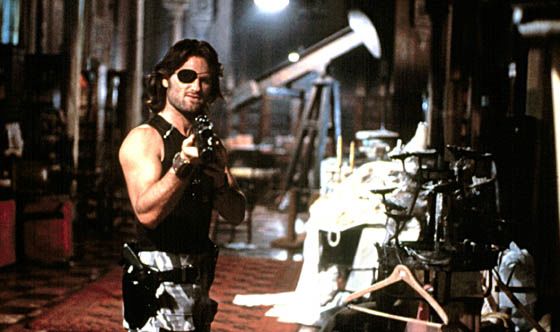
John Carpenter: Well you know it was originally written for Clint Eastwood. (laughs) So, that wasn’t hard to do. He came in with all of the ideas, the long hair, the eye patch, and Eastwood’s voice… well not exactly, but he had all of those ideas.
Quint: It’s interesting that the eye patch idea, because I have to imagine that that wasn’t all that comfortable.
John Carpenter: One he could see through, one he couldn’t.
Quint: Just so we don’t run out of time, I want to jump over to BIG TROUBLE IN LITTLE CHINA. I keep talking about the diversity in your filmography and no other movie shows that more than BIG TROUBLE IN LITTLE CHINA. It’s a very unique film. I can’t think of another one that’s like it.
John Carpenter: Well, thank you. That’s nice. I like BIG TROUBLE a lot.
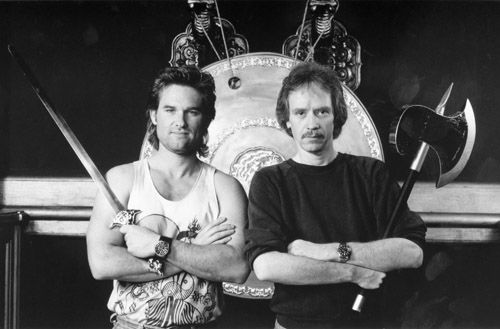
Quint: It’s a dark fairy tale, but it’s not dark in comparison to something like PRINCE OF DARKNESS or IN THE MOUTH OF MADNESS, but it’s definitely not your typical family fair that’s for sure. Again it’s the tone. Was that tone something that you found in W.D. Richter’s script?
John Carpenter: He’s a very quirky writer and a lot of the dialogue was Richter’s main contribution. Now this was an existing western before Richter rewrote it and he rewrote it as a modern day film.
You know, I went to film school with him and he was the professor’s darling. They loved him, which pissed me off a great deal. (laughs) I liked Richter a lot.
The studio wanted RAIDERS OF THE LOST ARK, clearly that’s what they wanted. They wanted a movie like that. “Can’t you just do that?” They didn’t ever actually say that to me, but I know that’s what they wanted. “Xerox it.” But I had other ideas and I thought it would have been interesting at least from my point of view, maybe nobody else’s, but to make the white lead… You know in the Tarzan films Tarzan is white and he always saves the natives. “Oh, thank you Tarzan!” It’s just ridiculous. I was like “What about if your white lead is a complete fool?” He has no idea what he is doing. He thinks he does… He’s this big blowhard. He’s kind of a John Wayne blowhard in the fact that he has no ability at anything, but he thinks he does and he rolls around and ‘Jack Burton says this,’ and talks about himself. And Kurt just went for it and of course to the horror of everybody at the studio. Absolute horror. They didn’t want THAT kind of comedy.
Quint: Well it was the horror to the people of the studio then, but not the people now as they press the 18th version of the DVD or the Blu-Ray and people buy it up.
John Carpenter: Too late! But it was not a pleasant studio experience. It was fun to shoot. We had a blast shooting the movie and working with all of the martial artists. You know, I was around in film school when the first martial arts craze hit with FIVE FINGERS OF DEATH. I began to see a bunch of them because they became popular. No matter what the fighting style was, the kung fu, there was an innocence to these films which was just absolutely delightful and that had to do with the kind of Hong Kong cinema, the way they movies and the way they saw things and the things they accepted as part of reality. They were just delightful, so I thought “Well, I would like to capture a little of that.” It was almost like a fairy tale in a way, so that was the approach.
Quint: If you look at your work with Kurt up until Big Trouble, he had always been a very strong hero that can get out of any situation. I liked that you turned that on its head a bit with the Jack Burton character, but yet somehow he’s still a character that fans revere as much as a Snake Plisskin in a weird way. It’s interesting to me to watch the cult of Jack Burton kind of spring up around this guy who is a giant doofus throughout the whole movie.
John Carpenter: Well, there is a little bit of Jack Burton in all of us. We are all Jack Burton, there’s no question about it.
Quint: You know the Alamo Drafthouse is doing an event here for They Live…
John Carpenter: I just did a visual hello to you guys.
Quint: Oh, that’s very cool. Have you seen Shepard Fairey’s poster for it?
John Carpenter: Dude, I held it up in the visual presentation. I love that poster.
Quint: It’s awesome isn’t it?
John Carpenter: Yeah.
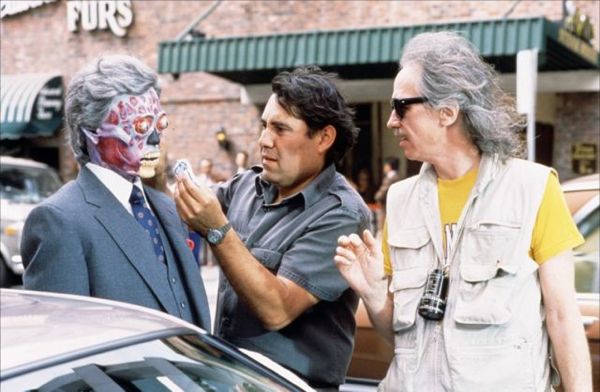
Quint: I’m a really big THEY LIVE fan as well and that’s a movie that I I saw fairly early on. It’s been the kind of movie that has meant different things for me as a I have kind of grown up with it. The first time I watched it it was all about the aliens and the action…
John Carpenter: Hey, let me ask you a question.
Quint: Sure.
John Carpenter: How old are you?
Quint: I’m 30.
John Carpenter: My god, you’re a baby. You are a child. This really pisses me off!
Quint: I’m sorry. I’ve been doing this since I was 15.
John Carpenter: I hate you. (laughs)
[The publicist interrupts with “Last question.”]
John Carpenter: Go ahead. Take your time.
Quint: We should probably use the last question for The Ward, since that is hitting VOD now. Is there a reason you didn’t score it yourself?
John Carpenter: Well dude, I found somebody better than me who actually did an orchestral score and I thought really brilliantly. Mark Kilian is a really talented South African composer. He’s done a lot of different kinds of movies. I met several composers in the money range that we could afford and damn he was just… He did stuff I hadn’t heard before. I did get him to do a little riff on SUSPIRIA. I said “listen to this…” We listened to SUSPIRIA, listened to (Claudio) Simonetti and you think about it, it’s this whole child’s mind thing that’s really creepy and we could use this, so he did a take. His is great. I just met Simonetti by the way.
Quint: Oh, really?
John Carpenter: Yeah, and I met the beautiful Asia Argento.
Quint: Yeah, I met her a long time ago when she was promoting that Vin Diesel movie XXX. She’s gorgeous.
John Carpenter: The only thing that pissed me off was that Eli Roth was with her. That pissed me off a great deal.
Quint: [Laughing] Why did that piss you off?
John Carpenter: I don’t know, there’s this young genius filmmaker walking in with this beautiful woman, it just pisses me off. I’m old now, what do you want from me?!?
Quint: Cool man, well thanks so much. I really appreciate you taking the time to kind of look back with me on this.
John Carpenter: Hey, it was fun.
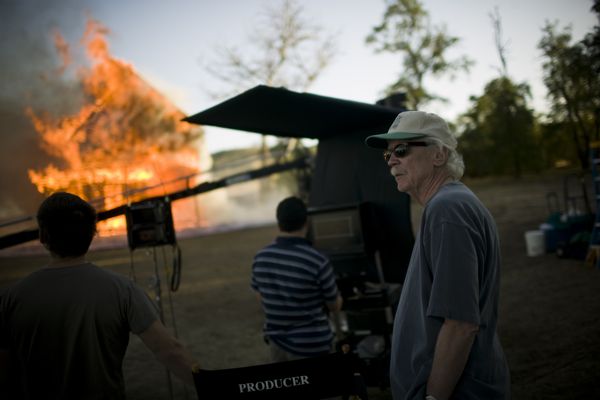
See what I mean? I feel like I was rushing to the middle with this one, there’s just so much to his career. The recent Spielberg interview I think shows that it’s much better to focus on one movie and have some fun tangents to others, but I don’t know what I’d pick with Carpenter. I mean, I’m a massive, massive fan of both Prince of Darkness and In the Mouth of Madness, both films that don’t get talked about nearly enough, but the man also made one of the most influential horror films since Psycho in Halloween.
If I can wrangle another chat with the man, you better believe we’re hitting Prince of Darkness, They Live, Star Man, Christine and In the Mouth of Madness. Also I need to talk about his troupe… people like Buck Flower, Victor Wong and Peter Jason. There's so much more to discuss.
So, put the good vibes out there that the movie gods smile upon us for a sequel to this interview!
In the meantime, Carpenter has a new flick out on VOD this week, with a theatrical run coming soon. So, support the man and give The Ward a look! We want to see that "gothic western" someday, right?
-Quint
quint@aintitcool.com
Follow Me On Twitter

